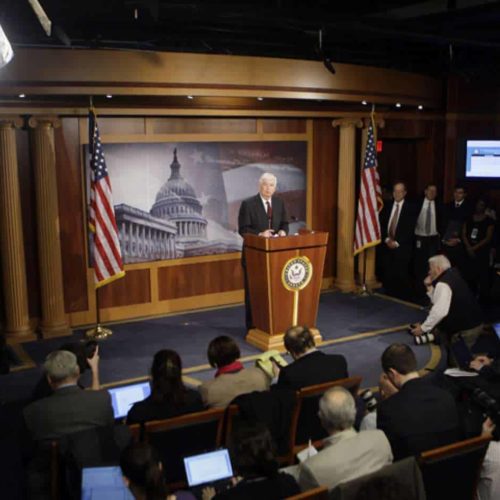Introduction
The fine print in the sweeping overhaul of the U.S. financial system proposed by Sen. Christopher Dodd reveals loopholes, ambiguities and unanswered questions about some key players — among them a new consumer protection bureau, credit-rating companies and payday lenders.
Dodd, the Connecticut Democrat who chairs the Senate Banking Committee, unveiled his draft legislation on Monday. His plan’s details suggest his struggle to balance the conflicting demands of Republicans and the financial industry lobbyists, who oppose an independent new consumer agency, and Democrats, many of whom question whether Dodd has gone far enough.
Dodd has stressed the reach of his blueprint, especially noting the importance of a new independent consumer watchdog to write rules for products such as mortgages and credit cards. “This crisis started when people were given mortgages they didn’t understand and could never afford,” said Dodd. “If there was a watchdog on duty, it didn’t bark.”
Still, the legislation would impose significant limits on the autonomy of the new watchdog. It would establish a Financial Stability Oversight Council of nine members, all but one of whom would be existing financial regulators such as the Treasury Secretary and Comptroller of the Currency, which oversees national banks.
Just one member of the Council would have the power to delay the bureau’s suggested regulations, and six would be needed to override them. Council members could block any bureau recommendation they feel threatens the stability of the banking system.
Even before it crafted a rule, the consumer bureau would be required to consult with other financial regulators about whether the rule would be consistent with the objectives of those existing agencies, some of which have been accused of being lax in the lead-up to the financial crisis. The bureau also would have to consult with the Federal Trade Commission before imposing any regulations.
Nor would the consumer bureau be allowed to examine the books of any lender without first coordinating with other federal and state bank examiners so that they all go on the same day — a measure intended to reduce the regulatory burden on lenders.
In addition, the new bureau would have to rely as much as possible on existing documents of the financial institutions it oversees and could not dictate that they use any specific technology to aid the bureau in monitoring.
The consumer bureau would be housed in the Federal Reserve. While Dodd said the Fed wouldn’t have “one iota” of authority over the bureau — and would basically be renting office space — the bill provides for the presidents of the regional Fed banks to recommend at least six members to the bureau’s advisory board.
Much of the bill addresses what the consumer bureau would not be able to do. For instance, the bureau could not declare a lending practice “unlawful” simply because it is deemed unfair. To be illegal, the practice must be “likely to cause substantial injury to consumers, which is not reasonably avoidable by consumers.”
It’s also unclear exactly which lenders the bureau could regulate. Take, for example, payday lenders, which offer short-term, high interest loans.
Dodd’s bill does not actually mention the word “payday.” Yet Dodd’s 11-page summary of the bill does. The summary says a new consumer protection bureau housed within the Fed will have the authority to examine and enforce regulations for “large payday lenders.” But “large” is not defined.
“It’s not clear what ‘large’ means,” states the “Payday Pundit,” a blog of the industry trade group, the Community Financial Services Association. “I will try to seek clarification over the next few days.”
Another payday industry lobbyist told the Investigative Fund that he believes Dodd intends for the consumer protection bureau to determine what “large” means.
As the Investigative Fund has reported, the industry spent about as much as JP Morgan & Co. last year on lobbying alone, and is engaged in an aggressive campaign to resist being ruled by Washington.
Payday lenders were not explicitly mentioned in the approved House version of financial reform either. Amid uncertainty, the bill’s author, financial services committee chair Barney Frank (D-Mass), quickly dispatched a letter to his colleagues saying the new consumer agency would have authority over them.
Separately, Dodd’s bill targets the nation’s top credit rating companies, such as Standard & Poor’s and Moody’s.
As the Investigative Fund reported in a three-part series last year, the raters have long dodged regulation using the First Amendment as a shield. But now, the raters are at the center of the financial crisis. They awarded inflated grades to investments — including ones they allegedly helped create — that ultimately unraveled the economy.
Dodd’s bill calls for a new credit rating overseer within the Securities and Exchange Commission, which will have the authority to fine — or even de-register — the companies for repeated mistakes. The bill also would require ratings analysts to pass qualifying exams and receive relevant education.
But in certain ways, Dodd doesn’t appear to have been as forceful with the raters as Frank was last year. Whereas Frank would remove most, if not all, requirements that investors and banks rely on credit ratings, Dodd called for a Government Accountability Office study of this step. Meanwhile, his bill would direct regulators to remove whatever statutory references to credit ratings that they see as unnecessary. Again, however, it’s unclear exactly what that wording means.
Dodd, like Frank, provided investors the first explicit right to sue the rating companies. But Frank’s bill set forth a seemingly easier standard for suing the raters.
Ultimately, Dodd’s measures, clear and ambiguous alike, face an uncertain future. They are subject to change as the full banking committee takes up amendments to the bill next week.
Read more in Inequality, Opportunity and Poverty
Finance
Why Fannie and Freddie continue to cost taxpayers billions
Treasury secretary to testify Tuesday on mortgage giants
Finance
Goldman Sachs publicly backs financial reform — while dispatching army of lobbyists
Amid attempts to rein in Wall Street, persuaders safeguard bank’s interests


Join the conversation
Show Comments